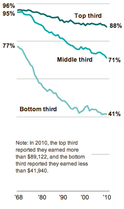
That is the first thing Omarina Cabrera said in a Frontline documentary entitled Middle School Moment that premiered yesterday on PBS. As a child with a single mother there was little money to support her efforts in school and she became one of the numerous students across the country to struggle in her education. Luckily she was one of the few who was helped by the system her school put in place: a group of teachers and counselors who were able to craft plans to support these struggling students. But, there is an important caveat: with reduced funding, this won't be enough without help from other adults outside the school.

Children in wealthier families are able to participate in sports and other extracurricular activities that enrich and support their learning; children in more poverty-like situations do not have the money for those activities and the adults in their lives lack the time for it as well.
Valerie Strauss of the Washington Post write a great piece yesterday regarding poverty's effects in education and how the government is ignoring what it should be doing. She pointed out a quote from Stanford Professor of Education Linda Darling-Hammond in saying:
Poverty rates make a huge difference in student achievement. Few people are aware, for example, that in 2009 U.S. schools with fewer than 10 percent of student in poverty ranked first among all nations on the Programme for International Achievement tests in reading, while those serving more than 75 percent of students in poverty scored alongside nations like Serbia, ranking about fiftieth.
So why then are President Obama and Secretary of Education faltering? Because of their blatant push for unachievable standards and lack of research-based knowledge in their proposals. Just today the Obama administration announced a core effort to provide payment bonuses for teachers who are willing to share their knowledge. While this sounds like a great idea in thought, it goes against what teachers say they want! In my previous post, I shared a graph from the Bill and Melinda Gates Foundation report entitled Primary Sources in which merit-pay was the last item on the list.
I appreciate the energy they are obviously putting into these ideas but they need to put in more thought before getting them off the ground. If we are to use education as a way of getting control of the cycle of poverty, we need to focus on supporting the effort every step of the way: before, during, and after school hours, with parents and community members participating, with support from social workers and non-profits across the country. Only then will we truly be able to say we are the "land of the free."


 RSS Feed
RSS Feed
